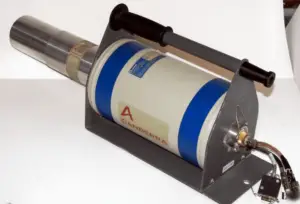
High-purity germanium detectors (HPGe detectors) are the best solution for precise gamma and x-ray spectroscopy. In comparison to silicon detectors, germanium is much more efficient than silicon for radiation detection due to its atomic number being much higher than silicon and due to lower average energy necessary to create an electron-hole pair, which is 3.6 eV for silicon and 2.9 eV for germanium. Due to its higher atomic number, Ge has a much lager linear attenuation coefficient, which leads to a shorter mean free path. Moreover silicon detectors cannot be thicker than a few millimeters, while germanium can have a depleted, sensitive thickness of centimeters, and therefore can be used as a total absorption detector for gamma rays up to few MeV.
Advantages and Disadvantages of HPGe Detectors
Advantages of HPGe Detectors
- Higher atomic number. Germanium is preferred due to its atomic number being much higher than silicon and which increases the probability of gamma ray interaction.
- Germanium has lower average energy necessary to create an electron-hole pair, which is 3.6 eV for silicon and 2.9 eV for germanium.
- Very good energy resolution. The FWHM for germanium detectors is a function of energy. For a 1.3 MeV photon, the FWHM is 2.1 keV, which is very low.
- Large Crystals. While silicon-based detectors cannot be thicker than a few millimeters, germanium can have a depleted, sensitive thickness of centimeters, and therefore can be used as a total absorption detector for gamma rays up to few MeV.
Disadvantages of HPGe Detectors
- Cooling. The major drawback of HPGe detectors is that they must be cooled to liquid nitrogen temperatures. Because germanium has relatively low band gap, these detectors must be cooled in order to reduce the thermal generation of charge carriers to an acceptable level. Otherwise, leakage current induced noise destroys the energy resolution of the detector. Recall, the band gap (a distance between valence and conduction band) is very low for germanium (Egap= 0.67 eV). Cooling to liquid nitrogen temperature (-195.8°C; -320°F) reduces thermal excitations of valence electrons so that only a gamma ray interaction can give an electron the energy necessary to cross the band gap and reach the conduction band.
- Price. The disadvantage is that germanium detectors are much more expensive than ionization chambers or scintillation counters.
We hope, this article, Advantage and Disadvantage of HPGe Detectors, helps you. If so, give us a like in the sidebar. Main purpose of this website is to help the public to learn some interesting and important information about radiation and dosimeters.